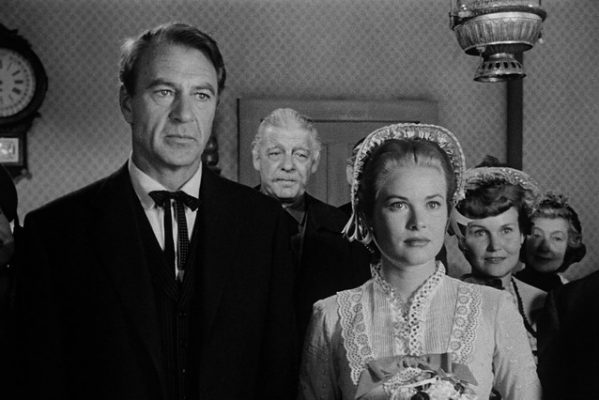In considering High Noon, one is tempted to observe that, “They don’t make them like that anymore!” but in truth, they didn’t (generally) make them like this back “then”.
The story begins with the wedding of Marshall Will Kane (Gary Cooper) to his Quaker bride, Amy Fowler (Grace Kelly). Kane is a widely respected figure in the town, who brought order where there had been chaos. However, he’s hanging up his badge to open a store in another town, to accommodate the beliefs of his new wife.
So far, so idyllic. A telegram arrives, informing Kane that Frank Miller, a dastardly evildoer sent to prison by him, has been released and is on the train arriving at, um…noon, supported by a trio of desperadoes who are waiting for him. Miller is clearly coming for revenge.
Obviously, an alternate (much more frivolous) title for the film could have been, “It’s Miller Time!”
Initially, Kane does the obvious smart thing. He’s already stepped down as Marshall, this is no longer his fight. He has a new life waiting waiting for him with Amy, they decide to leave town, who wouldn’t?
As they flee, you can see the conflict Kane is feeling playing out on Cooper’s face. He’s never run from a fight and he can’t begin now. Amy presents Kane with an ultimatum, leave town with her now, or she’ll leave town without him, on the noon train. O cruel irony!
Kane tries to recruit a posse, without success. It gets worse. His one deputy (a second is mentioned in one scene, but was a casualty of editing) Harvey Pell (Lloyd Bridges) is irked that he is not succeeding Kane and will only fight if Kane “has a word” with the city fathers. His actions revealing his unfitness for the job, Kane declines to do so and Pell walks away.
An additional source of tension between Kane and Pell exists in the form of Helen Ramirez (Katy Jurado), who had been Miller’s lover before she became Kane’s and her current beau is (you guessed it) Pell. Holy complicated love quadrangle, Batman! Jurado’s performance is spellbinding. She plays Ramirez as a strong and independent woman, when such roles were far from abundant, particularly in Westerns.
One of the paradoxes of High Noon is that while the script (by Carl Foreman) is expertly crafted, it is not a film that is rich in either dialogue or (especially) memorable quotes. It is ruthlessly efficient and tells the story effectively. There are long sections without dialogue, punctuated only by Dimitri Tiomkin’s magnificent score, never more memorably than in the moments leading up to the arrival of Miller’s train.
Cooper’s central performance is fantastic. He deservedly won his second Oscar for this movie. Lloyd Bridges observes in one of the extras than when he shot his first scene with Cooper, he thought Cooper was giving him nothing. It was only when he saw the rushes that he appreciated how effectively Cooper was playing to the camera.
Will Kane is not a standard Western hero. He fully expects to lose his life, protecting a town which is unwilling to protect itself. A sense of duty drives him, but he shows vulnerability and fear. Principles matter.
High Noon is a true classic. It was low budget and shot in only 28 days, but is a masterclass in film making. It features perhaps the most iconic crane shot in Hollywood history, showing just how isolated Kane finds himself. The cinematic storytelling is superb. In terms of the way shots are framed, it could easily translate into a graphic novel.
The 4K transfer by Eureka is lovely and there are several interesting and informative documentary features. A 100-page Collector’s Book is part of this Limited Edition Masters of Cinema release.
On Blu-ray from Mon 16 Sep 2019
